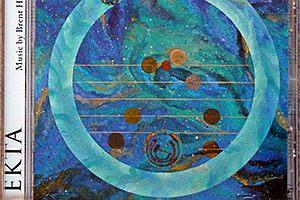Heisinger (who was born in 1937 in Stockton) is a graduate and faculty emeritus of San Jose State University, and quite up front about not being a stylistic John Hancock in the CD's booklet: "My works bounce from one palette to another. I have no desire to own a style." So warned, listeners may want to program track sequences, depending on their mood, for mood is a chief feature of Heisinger's music, rather than sing-along melodies or motivic development. There are five works on the CD:
Ekta is a New Agey, four-movement piano concertante. The first movement is much like Keith Jarrett's Celestial Hawk, and none the worse for the comparison. The second movement is for tabla and drum set alone. The third, "Love Song," begins like it would be a good soundtrack for a film titled Sunrise on the Ganges, but three minutes in, executes a gradual, but nonetheless wrenching, segue into a Hilton Hotel cocktail bar. The finale, "Fugue and Cadenza," attempts no formal counterpoint, but instead provides uplifting dance rhythms.
Listen to the Music
Three Episodes for Bassoon Quartet is an engaging 1930s-style piece of neoclassicism with a middle movement that veers into an English pastorale. A Walk Within Winter, with pianist Donna Stoering, begins as if the listener, in New Agey mood, is looking out from a warm room at winter's first quiet snowfall. Later, however, lured into the outdoors, the listener is pelted with hail as the storm changes character, forcing her back inside to the sounds of Minim's techniques and a bit of impressionistic pentatonicism.
The disk concludes with an attractive choral work, Nubes Aztecas (Aztec Clouds), in an entirely different time and hemisphere. This music should be enjoyed separately from the others, when you're in the mood for adoration of Aztec royalty, without blood sacrifice.

